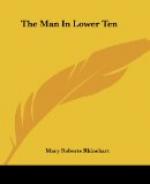“‘I couldn’t take it if it was for a million,’ said the man inside the room. ’I’d do it, I expect, if I could. The best of us have our price.’
“Bronson slammed the door then, and flung past me down the hall.
“After a couple of minutes I knocked at the door, and a tall man about your size, Mr. Blakeley, opened it. He was very blond, with a smooth face and blue eyes—what I think you would call a handsome man.
“‘I beg your pardon for disturbing you,’ I said. ’Can you tell me which is Mr. Johnson’s room? Mr. Francis Johnson?’
“‘I can not say,’ he replied civilly. ’I’ve only been here a few days.’
“I thanked him and left, but I had had a good look at him, and I think I’d know him readily any place.”
I sat for a few minutes thinking it over. “But what did he mean by saying he hadn’t seen the notes for ten days? And why is Bronson making the overtures?”
“I think he was lying,” Hotchkiss reflected. “Bronson hasn’t reached his figure.”
“It’s a big advance, Mr. Hotchkiss, and I appreciate what you have done more than I can tell you,” I said. “And now, if you can locate any of my property in this fellow’s room, we’ll send him up for larceny, and at least have him where we can get at him. I’m going to Cresson to-morrow, to try to trace him a little from there. But I’ll be back in a couple of days, and we’ll begin to gather in these scattered threads.”
Hotchkiss rubbed his hands together delightedly.
“That’s it,” he said. “That’s what we want to do, Mr. Blakeley. We’ll gather up the threads ourselves; if we let the police in too soon, they’ll tangle it up again. I’m not vindictive by nature; but when a fellow like Sullivan not only commits a murder, but goes to all sorts of trouble to put the burden of guilt on an innocent man —I say hunt him down, sir!”
“You are convinced, of course, that Sullivan did it?”
“Who else?” He looked over his glasses at me with the air of a man whose mental attitude is unassailable. “Well, listen to this,” I said.
Then I told him at length of my encounter with Bronson in the restaurant, of the bargain proposed by Mrs. Conway, and finally of McKnight’s new theory. But, although he was impressed, he was far from convinced.
“It’s a very vivid piece of imagination,” he said drily; “but while it fits the evidence as far as it goes, it doesn’t go far enough. How about the stains in lower seven, the dirk, and the wallet? Haven’t we even got motive in that telegram from Bronson?”
“Yes,” I admitted, “but that bit of chain—”
“Pooh,” he said shortly. “Perhaps, like yourself, Sullivan wore glasses with a chain. Our not finding them does not prove they did not exist.”
And there I made an error; half confidences are always mistakes. I could not tell of the broken chain in Alison West’s gold purse.




